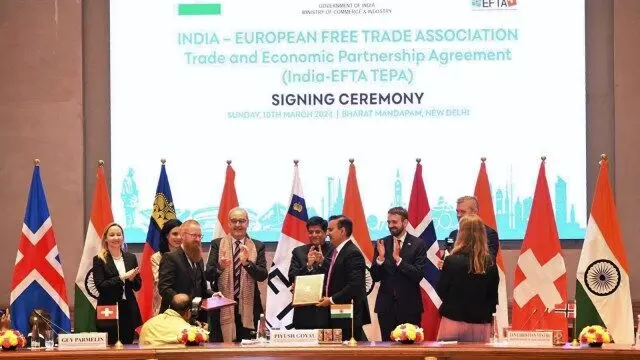
New Delhi, July 11 -- After 16 years of intense negotiations and patient diplomacy, a landmark trade pact between India and the European Free Trade Association (EFTA) is finally ready to enter into force. Switzerland's recent ratification has completed the final step in this transformative journey, paving the way for the Trade and Economic Partnership Agreement (TEPA) to become operational in October. With this development, India stands at the cusp of a new economic chapter-one defined by reduced trade barriers, substantial foreign investment, and deeper economic integration with advanced economies. The EFTA bloc-comprising Switzerland, Norway, Iceland, and Liechtenstein-might be small in population size, but it punches well above its weight in terms of economic and technological prowess. The TEPA, therefore, is not just another trade agreement; it is a strategic handshake between complementary economies. On one side is India, a rising global powerhouse with a vast market, youthful demographics, and expanding manufacturing capacity. On the other is EFTA, known for precision manufacturing, cutting-edge innovation, and high-value exports. The pact reflects a "win-win" arrangement, as described aptly by Swiss Ambassador Maya Tissafi. At the heart of the deal lies a remarkable investment commitment: the EFTA countries will invest a cumulative USD 100 billion in India over the next 15 years. This infusion is expected to create 10 lakh jobs in India-a crucial boost for a country seeking to accelerate job creation in the wake of pandemic-related setbacks and a slowing global economy. This long-term economic vision signals strong confidence in India's growth trajectory and regulatory climate. For India, the TEPA is particularly significant as it provides a gateway into some of the most developed economies of Europe. The agreement offers tariff reductions, progressive customs streamlining, and modern provisions on intellectual property and sustainable trade practices. These are not just technical details-they are the building blocks of smoother trade, faster clearances, and increased ease of doing business. Over time, Indian exporters, especially in sectors like pharmaceuticals, IT, textiles, and auto-components, are expected to benefit from improved market access and competitiveness in EFTA markets.
Switzerland, already the 12th-largest investor in India, brings particular weight to this partnership. Its investments in India have grown nearly twentyfold over the past quarter-century-from CHF 551 million in 2000 to CHF 10 billion in 2024. Swiss companies have embedded themselves into India's economic fabric, from manufacturing precision tools and chemicals to offering cutting-edge services in pharmaceuticals and engineering. Over 330 Swiss firms currently operate in India, and with the implementation of TEPA, this number is set to rise. Notably, the TEPA is not just about tariffs and trade. It is a forward-looking document that captures the spirit of modern economic cooperation. The launch of the Swiss-Indian Innovation Platform in Bengaluru in 2023 exemplifies this. By linking India's premier IITs with Swiss universities and private sector leaders, the platform aims to nurture collaborative R&D and joint innovation in critical areas such as sustainability, medtech, and clean energy. This dovetails neatly with India's ambition to become a global innovation hub and self-reliant in high-tech manufacturing. On a broader diplomatic canvas, the TEPA marks a consolidation of India's multifaceted relationship with Europe-one that balances strategic autonomy with mutually beneficial cooperation. For EFTA members, particularly Switzerland, the agreement underscores a clear willingness to deepen ties with India, even in a world increasingly marked by economic protectionism and supply chain fragmentation. At a time when global trade is under strain due to geopolitical rivalries and internal political churn in Western democracies, the successful conclusion of TEPA offers a model of pragmatic, forward-thinking partnership.
Moreover, the timing of this agreement is auspicious. India is actively pursuing new-generation trade agreements with several partners, including the UK, Australia, and the EU. Each deal presents unique opportunities and challenges, but collectively, they reinforce India's commitment to being a global trade and investment destination. The TEPA can serve as a benchmark for future agreements by emphasising not just market access, but also innovation, sustainability, and inclusive growth. Of course, implementation will be key. As Ambassador Tissafi has rightly pointed out, the TEPA's success will depend on how effectively it is executed on both sides. Regulatory cooperation, rapid approvals, and alignment between central and state authorities in India will be vital in turning this blueprint into ground realities. The opening of the EFTA Desk in India is a good start-it will function as a onestop facilitator for investors from these countries. Additionally, the collaboration with Indian business bodies will help build trust and awareness among domestic entrepreneurs looking to engage with EFTA markets. The recent visit by Commerce Minister Piyush Goyal to Switzerland and discussions with Federal Councillor Guy Parmelin to operationalise the TEPA reflect India's seriousness in getting the implementation phase right. Areas such as skills development, vocational training, and capacity building also feature in the agreement, promising long-term structural benefits beyond the realm of trade. In a world where trade relations are increasingly weaponised and global supply chains remain fragile, the India-EFTA agreement shines as a beacon of constructive cooperation. It speaks to the shared belief in open economies, innovation-led development, and people-centric progress. As India moves forward with this milestone agreement, it not only cements ties with some of Europe's most prosperous nations but also takes a confident step toward becoming a more influential and interconnected global economic actor.
Published by HT Digital Content Services with permission from Millennium Post.
